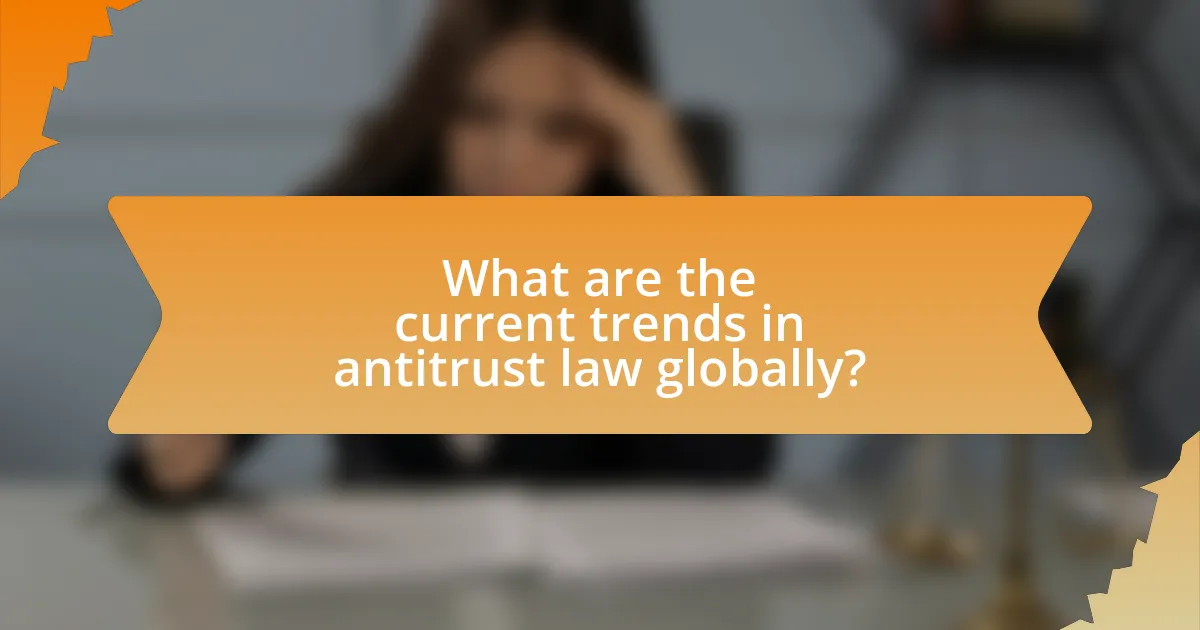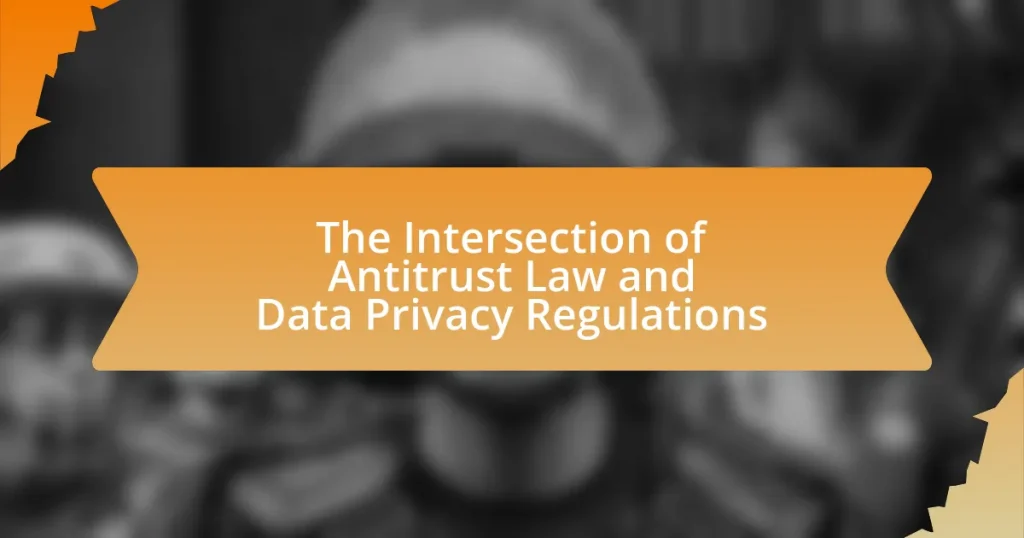The article examines the future of antitrust law in a globalized economy, highlighting the challenges posed by multinational corporations and digital markets. It discusses the need for international cooperation among antitrust regulators to address anti-competitive practices that cross national boundaries, as well as the evolution of legal frameworks to adapt to technological advancements. Key topics include the impact of globalization on antitrust regulations, varying approaches by different countries, and the implications of recent reforms in major economies like the EU and the US. The article emphasizes the importance of evolving antitrust laws to promote fair competition and protect consumer interests in an increasingly interconnected market.

What is the Future of Antitrust Law in a Globalized Economy?
The future of antitrust law in a globalized economy will increasingly focus on addressing the complexities of multinational corporations and digital markets. As globalization continues to blur national boundaries, antitrust regulators will need to collaborate internationally to tackle anti-competitive practices that transcend jurisdictions. For instance, the European Union has already implemented the Digital Markets Act to regulate large tech companies, setting a precedent for global standards. Additionally, the rise of data monopolies and platform economies necessitates a reevaluation of traditional antitrust frameworks, emphasizing the need for adaptive legal approaches that can effectively manage market power in a digital context.
How is globalization impacting antitrust law?
Globalization is significantly impacting antitrust law by necessitating the harmonization of legal frameworks across different jurisdictions. As multinational corporations operate in multiple countries, antitrust authorities face challenges in addressing anti-competitive practices that transcend national borders. For instance, the European Union and the United States have different approaches to antitrust enforcement, which can lead to conflicts and inconsistencies in regulation. This divergence complicates the enforcement of competition laws, as seen in cases like the Google antitrust investigations, where varying standards in the EU and the US have emerged. Consequently, globalization is driving a trend towards international cooperation and the development of more unified antitrust policies to effectively manage competition in a global market.
What are the key challenges posed by globalization to antitrust regulations?
Globalization poses significant challenges to antitrust regulations, primarily due to the complexities of enforcing laws across different jurisdictions. The increase in multinational corporations complicates the ability of individual countries to regulate anti-competitive practices effectively, as these companies can operate in multiple markets with varying legal frameworks. Additionally, the rapid pace of technological advancement and digital markets creates difficulties in defining market dominance and anti-competitive behavior, as traditional antitrust laws may not adequately address new business models. For instance, the rise of platform economies, where a few companies dominate the market, raises questions about fair competition that existing regulations struggle to resolve. These challenges necessitate a reevaluation of antitrust frameworks to ensure they remain effective in a globalized economy.
How do different countries approach antitrust law in a global context?
Different countries approach antitrust law through varying frameworks and enforcement mechanisms, reflecting their economic philosophies and regulatory priorities. For instance, the United States emphasizes consumer welfare and market competition, often focusing on preventing monopolistic practices through the Sherman Act and the Clayton Act. In contrast, the European Union adopts a more interventionist stance, prioritizing market fairness and consumer protection, as seen in its rigorous enforcement of Article 101 and Article 102 of the Treaty on the Functioning of the European Union, which address anti-competitive agreements and abuse of dominant positions.
Countries like China have developed their antitrust laws more recently, with the Anti-Monopoly Law of 2008 reflecting a blend of economic growth objectives and market regulation, emphasizing both consumer interests and state control. Meanwhile, jurisdictions such as Brazil and India are increasingly aligning their antitrust frameworks with international standards, focusing on promoting competition while considering local economic contexts.
These diverse approaches illustrate the complexities of global antitrust law, as countries navigate the balance between fostering competition and addressing unique national interests. The differences in enforcement and regulatory philosophies can lead to challenges in international business operations, as companies must comply with varying legal standards across jurisdictions.
Why is the evolution of antitrust law important in a globalized economy?
The evolution of antitrust law is crucial in a globalized economy because it addresses the complexities of international trade and competition. As businesses operate across borders, antitrust laws must adapt to prevent monopolistic practices that can harm consumers and stifle innovation. For instance, the rise of digital platforms has led to increased scrutiny of market dominance, as seen in cases involving major tech companies like Google and Facebook, which have faced investigations and fines for anti-competitive behavior. This evolution ensures that regulations keep pace with market dynamics, fostering fair competition and protecting consumer interests on a global scale.
What role does antitrust law play in promoting fair competition?
Antitrust law plays a crucial role in promoting fair competition by preventing monopolistic practices and ensuring a level playing field for businesses. These laws prohibit anti-competitive agreements, abuse of market dominance, and mergers that significantly reduce competition. For instance, the Sherman Act of 1890 in the United States established foundational principles against monopolies, leading to landmark cases like United States v. Microsoft Corp., which demonstrated the enforcement of antitrust laws to maintain competitive markets. By regulating corporate behavior, antitrust laws foster innovation, lower prices, and enhance consumer choice, thereby reinforcing the integrity of the market economy.
How can antitrust law adapt to technological advancements and market changes?
Antitrust law can adapt to technological advancements and market changes by incorporating flexible regulatory frameworks that account for the dynamic nature of digital markets. This adaptation involves updating legal definitions of market dominance to include data control and network effects, which are critical in technology-driven sectors. For instance, the European Union’s Digital Markets Act aims to address the challenges posed by large tech platforms by establishing clear rules for fair competition, demonstrating a proactive approach to evolving market conditions. Additionally, antitrust authorities can leverage advanced data analytics to assess competitive behavior more effectively, ensuring timely interventions against anti-competitive practices. This approach is supported by the increasing recognition of the need for regulatory agility in response to rapid technological innovation, as seen in various global antitrust reforms.

What are the current trends in antitrust law globally?
Current trends in antitrust law globally include increased scrutiny of big tech companies, a shift towards more aggressive enforcement, and a growing emphasis on consumer welfare and market competition. Regulatory bodies in the United States and Europe are actively pursuing investigations and lawsuits against major technology firms for anti-competitive practices, as seen in cases involving Google, Apple, and Facebook. Additionally, countries like China are implementing stricter antitrust regulations to curb monopolistic behaviors, reflecting a global movement towards enhanced regulatory frameworks. This trend is supported by a rise in public awareness and advocacy for fair competition, leading to legislative changes aimed at promoting market diversity and protecting consumer interests.
How are major economies reforming their antitrust laws?
Major economies are reforming their antitrust laws by increasing scrutiny on large technology companies and enhancing regulatory frameworks to address monopolistic practices. For instance, the European Union has proposed the Digital Markets Act, which aims to prevent anti-competitive behavior by major digital platforms, while the United States has seen bipartisan support for legislation aimed at curbing the power of big tech firms. These reforms are driven by concerns over market concentration and the need for fair competition, as evidenced by the rise in antitrust investigations and lawsuits against companies like Google and Facebook.
What specific reforms are being proposed or implemented in the EU?
The European Union is proposing several specific reforms aimed at enhancing antitrust regulations and ensuring fair competition in a globalized economy. Key reforms include the Digital Markets Act, which seeks to regulate large tech companies by imposing stricter rules to prevent anti-competitive practices, and the revision of the EU Merger Regulation to strengthen the scrutiny of mergers and acquisitions that could harm competition. Additionally, the EU is implementing the New Competition Tool, designed to address market imbalances and prevent anti-competitive behavior in sectors where traditional antitrust laws may not be sufficient. These reforms are supported by the EU’s commitment to fostering a competitive digital single market and ensuring consumer protection.
How is the United States adjusting its antitrust policies?
The United States is adjusting its antitrust policies by increasing scrutiny on large technology companies and revising enforcement strategies to address monopolistic practices. Recent actions include the Federal Trade Commission and the Department of Justice pursuing lawsuits against major tech firms like Google and Facebook, citing anti-competitive behavior. These adjustments reflect a shift towards a more aggressive regulatory approach, aiming to promote competition and protect consumer interests in a rapidly evolving digital economy.
What are the implications of international cooperation in antitrust enforcement?
International cooperation in antitrust enforcement enhances the effectiveness of regulatory actions against anti-competitive practices across borders. This collaboration allows countries to share information, harmonize legal standards, and coordinate investigations, which is crucial in a globalized economy where businesses operate internationally. For instance, the International Competition Network, comprising over 130 competition authorities, facilitates the exchange of best practices and promotes convergence in antitrust policies, leading to more consistent enforcement outcomes. Additionally, joint investigations, such as those seen in cases involving major tech companies, demonstrate how coordinated efforts can address complex market dynamics that transcend national boundaries.
How do international agreements influence national antitrust laws?
International agreements significantly influence national antitrust laws by establishing frameworks for cooperation and harmonization among countries. These agreements, such as the OECD Guidelines for Multinational Enterprises and the WTO’s Trade Facilitation Agreement, encourage nations to align their antitrust policies, thereby promoting fair competition and reducing trade barriers. For instance, the OECD’s work on competition policy has led many countries to adopt similar standards and practices, enhancing the effectiveness of enforcement across borders. This alignment helps prevent anti-competitive practices that could arise from differing national regulations, ultimately fostering a more integrated global economy.
What are the benefits and challenges of cross-border antitrust enforcement?
Cross-border antitrust enforcement offers benefits such as enhanced cooperation among jurisdictions, which can lead to more effective regulation of multinational corporations and the prevention of anti-competitive practices that may harm consumers globally. For instance, the European Union and the United States have collaborated on various cases, leading to significant penalties for companies engaging in anti-competitive behavior across borders.
However, challenges include differing legal standards and enforcement priorities among countries, which can create conflicts and complicate investigations. For example, while the EU may prioritize consumer welfare, other jurisdictions might focus on protecting domestic industries, leading to inconsistent outcomes. Additionally, the lack of harmonization in antitrust laws can result in legal uncertainty for businesses operating internationally, making compliance more complex.

What are the potential future scenarios for antitrust law?
Potential future scenarios for antitrust law include increased regulatory scrutiny, the adoption of new frameworks to address digital monopolies, and international cooperation on antitrust enforcement. Increased regulatory scrutiny is likely as governments respond to growing public concern over market concentration and consumer welfare, evidenced by recent high-profile antitrust cases against major tech companies. The adoption of new frameworks may occur to better address the unique challenges posed by digital platforms, as seen in proposals for ex-ante regulations in the European Union aimed at preventing anti-competitive practices before they occur. Lastly, international cooperation could strengthen as countries recognize the global nature of many corporations, leading to collaborative enforcement efforts, similar to the OECD’s initiatives on competition policy.
How might technology shape the future of antitrust regulations?
Technology will significantly shape the future of antitrust regulations by enabling more effective monitoring and analysis of market behaviors. Advanced data analytics and artificial intelligence can identify anti-competitive practices in real-time, allowing regulators to respond swiftly to potential violations. For instance, algorithms can analyze vast amounts of transaction data to detect patterns indicative of price-fixing or market manipulation, which traditional methods may overlook. Furthermore, technology facilitates greater transparency in digital markets, as seen with the implementation of data-sharing requirements for large tech firms, enhancing regulatory oversight. This evolution in regulatory capabilities is essential, given the rapid growth of digital platforms and their complex market dynamics, which challenge existing antitrust frameworks.
What impact will artificial intelligence have on market competition?
Artificial intelligence will significantly enhance market competition by enabling companies to optimize operations, reduce costs, and improve customer experiences. AI technologies facilitate data analysis, allowing businesses to make informed decisions quickly, which can lead to more innovative products and services. For instance, a study by McKinsey & Company found that AI adoption could increase global GDP by up to 16% by 2030, indicating a substantial impact on economic competitiveness. Furthermore, AI can lower entry barriers for new firms, fostering a more dynamic market environment. This increased competition may challenge existing regulatory frameworks, necessitating updates to antitrust laws to address potential monopolistic behaviors driven by AI capabilities.
How can regulators keep pace with rapid technological changes?
Regulators can keep pace with rapid technological changes by adopting adaptive regulatory frameworks that emphasize flexibility and continuous learning. These frameworks allow regulators to respond quickly to innovations, such as artificial intelligence and blockchain, which evolve at unprecedented speeds. For instance, the European Union’s Digital Services Act exemplifies a proactive approach, establishing guidelines that can be updated as technology progresses, ensuring that regulations remain relevant and effective. Additionally, collaboration with technology experts and stakeholders fosters a deeper understanding of emerging technologies, enabling regulators to craft informed policies that balance innovation with consumer protection.
What strategies can businesses adopt to navigate future antitrust challenges?
Businesses can adopt proactive compliance programs to navigate future antitrust challenges. Implementing robust training for employees on antitrust laws and regulations helps ensure that all staff understand the legal landscape and the importance of compliance. Additionally, conducting regular audits of business practices can identify potential antitrust risks before they escalate into legal issues.
Establishing clear internal policies that promote fair competition and transparency can further mitigate risks. For instance, companies can create guidelines for pricing strategies and collaborations with competitors to avoid anti-competitive behavior. Engaging with legal experts to stay updated on evolving antitrust regulations is also crucial, as it allows businesses to adapt their strategies in response to new legal precedents and enforcement trends.
These strategies are supported by the increasing scrutiny from regulatory bodies worldwide, as seen in recent high-profile antitrust cases against major corporations, which highlight the necessity for businesses to prioritize compliance and ethical practices to avoid significant penalties and reputational damage.
How can companies ensure compliance with evolving antitrust laws?
Companies can ensure compliance with evolving antitrust laws by implementing robust compliance programs that include regular training, monitoring, and legal audits. These programs should be designed to adapt to changes in legislation and enforcement practices, which have become increasingly dynamic in response to global market conditions. For instance, the Federal Trade Commission (FTC) and the European Commission have both intensified scrutiny on mergers and acquisitions, emphasizing the need for companies to stay informed about regulatory updates and case law. By conducting thorough market analyses and engaging legal experts, companies can proactively identify potential antitrust risks and adjust their business practices accordingly.
What best practices should businesses follow to avoid antitrust violations?
To avoid antitrust violations, businesses should implement clear compliance programs that educate employees about antitrust laws and promote fair competition. These programs should include regular training sessions, clear guidelines on permissible conduct, and mechanisms for reporting potential violations. Additionally, companies should conduct regular audits of their business practices to ensure compliance with antitrust regulations. For instance, the Federal Trade Commission emphasizes the importance of proactive compliance measures, which can significantly reduce the risk of violations and associated penalties. By fostering a culture of compliance and transparency, businesses can effectively mitigate the risk of antitrust issues.
What are the key takeaways for stakeholders in the future of antitrust law?
Key takeaways for stakeholders in the future of antitrust law include the need for adaptability to evolving market dynamics and increased scrutiny of digital platforms. Stakeholders must recognize that antitrust regulations are likely to become more stringent, particularly in response to monopolistic behaviors observed in technology sectors. For instance, the European Union’s Digital Markets Act aims to ensure fair competition by imposing obligations on major tech companies, highlighting a global trend towards more rigorous enforcement. Additionally, stakeholders should prepare for potential international cooperation among regulatory bodies, as seen in recent discussions among G20 nations on harmonizing antitrust policies. This evolving landscape necessitates proactive engagement with regulatory changes to mitigate risks and capitalize on opportunities in a competitive environment.



